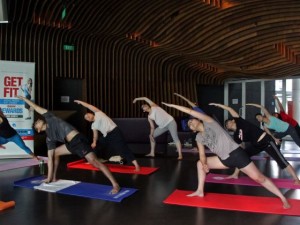SINGAPORE — Just a few months ago, media executive Devina Qiu’s life was consumed with work, leaving the 25-year-old with no time or inclination for exercise.
But when her workplace at one-north began offering free mass exercise classes and lunchtime health workshops, she signed up for Zumba and kickboxing – and ended up losing 1kg in a month.
The classes and workshops are among a slew of initiatives rolled out in the newest, and largest, Healthy Workplace Ecosystem in one-north, which was officially launched today (June 24).
Spanning 200 hectares, the one-north ecosystem – master-planned and developed by JTC Corporation – comprises seven precincts ranging from residential, office to lifestyle settings: Biopolis, Fusionopolis, Mediapolis, Nepal Hill, Vista, Wessex and Ayer Rajah.
The ecosystem is expected to reach out to more than 30,000 one-north employees by the end of the year, with the initial phase launched last November already reaching 3,700.
Besides keeping fit with physical activities, one-north employees have healthier dining options to choose from. Every stall at its two key food courts has been dishing out at least one 500kcal meal since last November. These meals, prepared with healthier cooking methods or ingredients, make up about 21 per cent of meals sold at one-north.
There are currently two other ecosystems. The first, launched in October 2013, was Mapletree Business City; the second was launched last November in seven Ascendas business clusters, including Singapore Science Park and Changi Business Park, in collaboration with the Health Promotion Board (HPB).
The Tripartite Oversight Committee (TOC) for Workplace Health aims to reach more than 120,000 workers in business clusters islandwide by the end of March next year.
Senior Minister of State (Health and Manpower) and TOC chairman Dr Amy Khor said: “We can make these health activities readily accessible to workers in the area… particularly those working in SMEs (small and medium-sized enterprises) who may not have such activities in their companies for various reasons, such as lack of manpower or capabilities.”
Mr Heah Soon Poh, JTC Corporation’s assistant chief executive officer, said the demographics in each ecosystem mean that different programmes have to be tailored for the different ecoystems. “In one-north, you have your start-ups in Launchpad to scientists in A*STAR, while in Mapletree you have more offices,” he added.
Dr Khor added that the success of selling healthier meals in Mapletree encouraged the same feature in one-north. “Some tenants even saw sales increase by 5 to 10 per cent,” she added.
The Healthy Workplace Ecosystem makes up part of a new three-pronged framework announced by the TOC today.
The TOC also plans to reach out to 11,000 mature workers — those above 40 years old — by the end of next March, through industry-specific health and wellness programmes, as well as promoting holistic workplace health and safety through the Total Workplace Health and Safety approach.
In a one-year pilot programme to promote healthy living, 3,000 taxi drivers aged 40 years and above received health screenings and tests.
National Trades Union Congress assistant secretary-general Yeo Guat Kwang told reporters that the TOC is planning to expand the programme to the cleaning and security industries soon, and will consider “other service sectors such as F&B, retail, and education”.
Organisations and developers can leverage on the Workplace Health Promotion Cluster Grant offered by the HPB, to make healthy living more accessible for employees at the workplace. The HPB did not share how much it has given out so far.
From: Today

